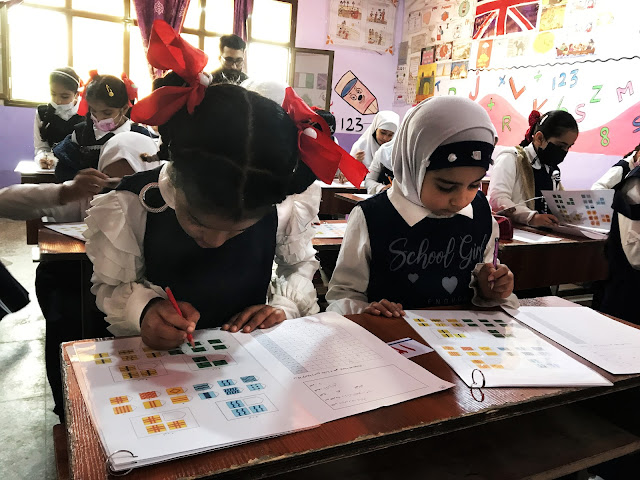A Field Study on Mathematics and Programming Education in Iraqi Primary Schools, Supported by Castalia, Published in a Multidisciplinary International Academic Journal
A paper examining the impact of programming education conducted by Castalia has been published in a multidisciplinary international academic journal.
The title of the paper is "The impact of computer science education in primary schools: Evidence from a randomized controlled trial in Iraq".
■ About the Study and the Paper
 |
| Photo: Fourth-grade girls at a girls' primary school taking an assessment test |
The study targeted approximately 1,600 fourth-grade students across 40 schools in the Zubair district of Basra Governorate. The research employed a randomized controlled trial (RCT) methodology.
This study is a significant step toward providing scientifically grounded evidence for international cooperation in educational development.
- Educational effects were particularly notable among girls, especially those in the lower-performing group, where the combination of programming and mathematics education showed high effectiveness.
- Lessons that incorporated the math app demonstrated greater educational effectiveness and contributed to sustained learning outcomes.
- Although the impact on boys was limited, the study suggests that improving access to digital education for girls may help close the gender gap in education.
Paper Title:
The impact of computer science education in primary schools: Evidence from a randomized controlled trial in Iraq
Published in: PLOS ONE
URL: https://doi.org/10.1371/journal.pone.0323166
■ Castalia’s Role and Local Support in the Study
 |
| Left: Boys at a primary school taking a math test with printed materials Right: Students learning math via educational videos on tablets |
In this field study, Castalia was responsible for both cooperating in planning the educational practices and providing on-site support during implementation. In particular, Mr. Mohannad AL Yakoub, a staff member of Castalia, played a central role in carrying out programming education at local primary schools in Basra, Iraq, under very difficult circumstances. While leading the local staff, he made significant contributions to the project.
To support the field implementation, Castalia prepared Ozobot, a micro-robot for programming education sold in Japan, and GOOCUS Edge, which enables group-based digital learning even in environments without internet access. In addition, Castalia oversaw tablet preparation, localized instructional material design, and lesson facilitation management. The company consistently provided comprehensive support tailored to the local educational environment.
Furthermore, through close collaboration with local teachers and direct communication with students, Castalia helped build a practical operational model for classroom implementation. The company also served as a bridge between the research team and local education stakeholders, ensuring the smooth progression of the project involving more than 1,600 children across 40 schools in a short timeframe.
Details about Castalia's activities in Iraq are featured in the following article(Japanese):
Becoming a bridge of language and culture to deliver educational opportunities to children around the world / Castalia Co., Ltd.
■ About Castalia Co., Ltd.
Castalia Co., Ltd. operates with the mission of “solving social issues through education and IT.” It develops and provides the mobile learning platform “Goocus,” together with its original programming education materials. Its operations span beyond Japan to the Middle East and Africa, contributing to sustainable development through expanded educational opportunities and ICT human resource development.
URL: https://en.castalia.co.jp/

